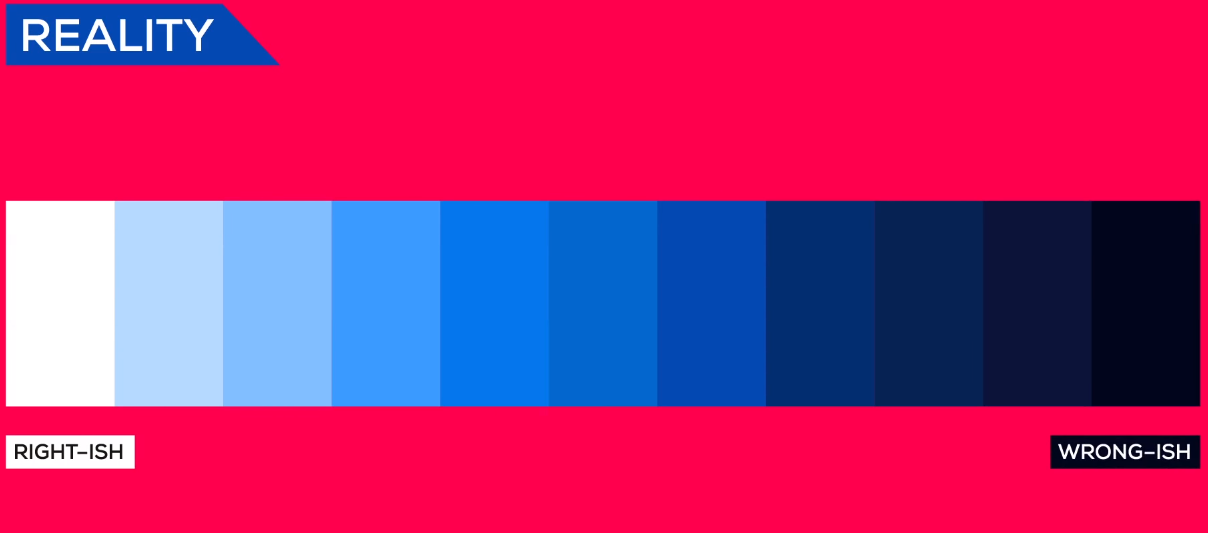Right and Wrong
2016-05-31
It is common knowledge in the study of philosophy that though people tend to think in binary, black and white, and right or wrong, that many parts of real life are not that way. Moral questions, truths, and facts are sometimes better expressed as spectrums.
Take the questions of what is right and what is wrong. A popular question in ethics is the Trolley Problem, you’ve probably heard it. It goes like this (from Wikipedia):
There is a runaway trolley barreling down the railway tracks. Ahead, on the tracks, there are five people tied up and unable to move. The trolley is headed straight for them. You are standing some distance off in the train yard, next to a lever. If you pull this lever, the trolley will switch to a different set of tracks. However, you notice that there is one person on the side track. You have two options: (1) Do nothing, and the trolley kills the five people on the main track. (2) Pull the lever, diverting the trolley onto the side track where it will kill one person. Which is the correct choice?
Pulling the lever of course. One death is less than five deaths, since allowing deaths is wrong, the choice must be to pull the lever, killing only one human being instead of five.
Ah! But the catch:
As before, a trolley is hurtling down a track towards five people. You are on a bridge under which it will pass, and you can stop it by putting something very heavy in front of it. As it happens, there is a very fat man next to you – your only way to stop the trolley is to push him over the bridge and onto the track, killing him to save five. Should you proceed?
Now, things have changed just a little haven’t they? Not the numbers, but your gut feeling about it. Something is more wrong about pushing the man off the bridge, otherwise you wouldn’t feel worse about it in your gut. Maybe you could argue that it is harder to push the man, not physically harder - he could be standing next to a ledge with no railing - but more morally difficult to push the fat man. Morally difficult isn’t really any different than moral though, so that argument goes off the bridge so to speak. I’m really not aiming to answer why it is more wrong to push the man than it is to pull the lever, but just using this example to show that ethics is not a binary subject. Is killing a mosquito wrong? Is killing a deer wrong? Is killing a dog wrong? Is killing a human wrong? If a person does a wrong deed one day, but a right deed the next day, are they a good person? If a person is feeling down and says “glass half empty” but has cheered up later and says “glass half full” are they an optimist or a pessimist? Should I be penalized if I arrive at work a second after I’m supposed to? Should I if I arrive at work a minute after I’m supposed to? Ten minutes? An hour? Am I good at programming? Am I as good as my peers? Spectrums, spectrums everywhere!
This idea of spectrums instead of categories can be a really powerful way of thinking, if only because it is contrary to the natural way of thinking. Your brain - and mine too - is built to extract patterns from the senses, patterns are ways of categorizing data, and categories are inherently binary, as I hope my examples showed. Human language is categorical. Right, wrong, hot, cold, yes, no, now, tomorrow, even: maybe, warm, and, sometime are categories of a kind. Aren’t there some feelings between warm and hot, ones that don’t have names? We think in human language (or do we?), but it can be powerful to step back and see a continuous spectrum. In this example: You’re driving when some guy in a pickup truck cuts you off, causing you to slam on the brakes and get rear ended. The pickup truck driver speeds off, leaving you and the poor soul who rear ended you to deal with his mess. That guy's an asshole, right? We share the road, he can’t do whatever he feels like because he has a huge truck.
Now try to answer the question of: how much of an asshole is this guy? Where does this guy fall on the spectrum from drill sergeant to librarian? Well, it’s hard to say. Maybe he didn’t see you before he cut you off, or maybe he didn’t see that you got rear ended because of it, maybe his wife is in the passenger seat giving birth to triplets and they are rushing to the hospital. Thinking about spectrums is thinking about perspective and human judgment, it can show that our judgement is more a reflection of ourselves than the ones we are judging. Thinking with perspective in mind makes for a more intelligent decision making process, and dare I say a healthier and happier life. Sure, not by much, but happiness is a spectrum, isn’t it?
Sources
I first came across the idea that not everything is black and white at a summer camp about quests in literature. The teacher who taught me the idea explained it better than this post, and so deserves this mention. You know who you are.
I also was just reminded of this idea in a youtube video about a different topic by Kurzgesagt. The video is also where the picture from the top comes from.
